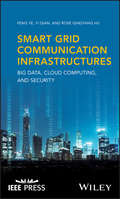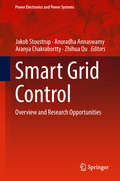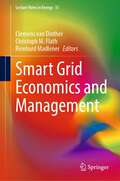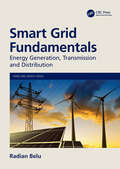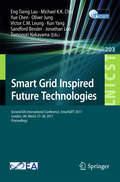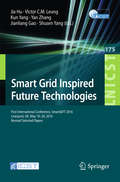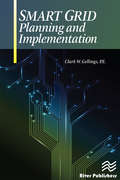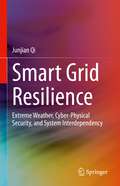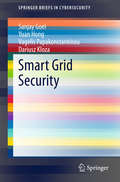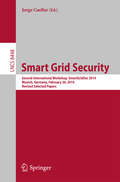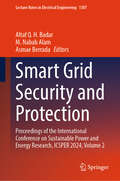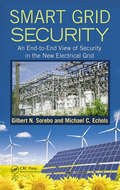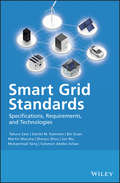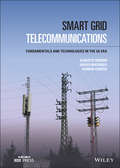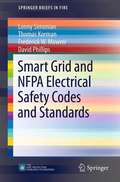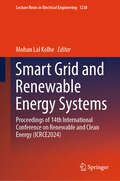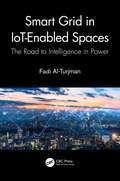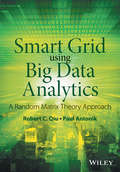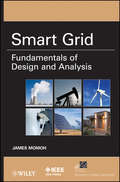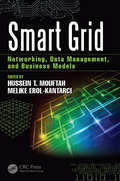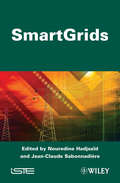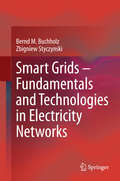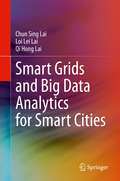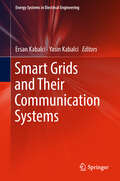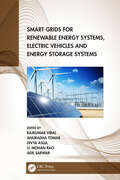- Table View
- List View
Smart Grid Communication Infrastructures: Big Data, Cloud Computing, and Security (Wiley - IEEE)
by Yi Qian Rose Qingyang Hu Feng YeA comprehensive resource that covers all the key areas of smart grid communication infrastructures Smart grid is a transformational upgrade to the traditional power grid that adds communication capabilities, intelligence and modern control. Smart Grid Communication Infrastructures is a comprehensive guide that addresses communication infrastructures, related applications and other issues related to the smart grid. The text shows how smart grid departs from the traditional power grid technology. Fundamentally, smart grid has advanced communication infrastructures to achieve two-way information exchange between service providers and customers. Grid operations in smart grid have proven to be more efficient and more secure because of the communication infrastructures and modern control. Smart Grid Communication Infrastructures examines and summarizes the recent advances in smart grid communications, big data analytics and network security. The authors – noted experts in the field – review the technologies, applications and issues in smart grid communication infrastructure. This important resource: Offers a comprehensive review of all areas of smart grid communication infrastructures Includes an ICT framework for smart grid Contains a review of self-sustaining wireless neighborhood that are network designed Presents design and analysis of a wireless monitoring network for transmission lines in smart grid Written for graduate students, professors, researchers, scientists, practitioners and engineers, Smart Grid Communication Infrastructures is the comprehensive resource that explores all aspects of the topic.
Smart Grid Control: Overview And Research Opportunities (Power Electronics And Power Systems Ser. #3)
by Aranya Chakrabortty Jakob Stoustrup Anuradha Annaswamy Zhihua QuThis book focuses on the role of systems and control. Focusing on the current and future development of smart grids in the generation and transmission of energy, it provides an overview of the smart grid control landscape, and the potential impact of the various investigations presented has for technical aspects of power generation and distribution as well as for human and economic concerns such as pricing, consumption and demand management.A tutorial exposition is provided in each chapter, describing the opportunities and challenges that lie ahead. Topics in these chapters include:wide-area control;issues of estimation and integration at the transmission;distribution, consumers, and demand management; andcyber-physical security for smart grid control systems.The contributors describe the problems involved with each topic, and what impact these problems would have if not solved.The tutorial components and the opportunities and challenges detailed make this book ideal for anyone interested in new paradigms for modernized, smart power grids, and anyone in a field where control is applied. More specifically, it is a valuable resource for students studying smart grid control, and for researchers and academics wishing to extend their knowledge of the topic.
Smart Grid Economics and Management (Lecture Notes in Energy #51)
by Reinhard Madlener Clemens Van Dinther Christoph M. FlathThis book focuses on market/regulatory issues concerning smart grid applications, business cases and use cases. It covers the most relevant aspects of the smart grid—design considerations, economics, legal aspects and system management—and includes exercises at the end of each chapter. Since renewable energy generation is weather-dependent, it is more volatile, which affects market prices and the need for flexibility options including demand side management. In order to balance supply and demand in a sustainable manner also with high shares of renewables, energy systems need to be enhanced by smart grid technologies. This co-evolutionary transformation of the energy system, economic, societal, political and regulatory domains is challenging and calls for an integrated and interdisciplinary approach. This book provides an essential basis to prepare lecturers and students for engaging in the new energy world.
Smart Grid Fundamentals: Energy Generation, Transmission and Distribution (Nano and Energy)
by Radian BeluThis textbook provides a comprehensive overview of smart grids, their role in the development of new electricity systems, as well as issues and problems related to smart grid evolution, operation, management, control, protection, entities and components.The book consists of eleven chapters, covering core topics such as energy, environmental issues, basic of power systems, introduction to renewable energy, distributed generation and energy storage, smart grid challenges, benefits and drivers, smart power transmission and distribution. It includes chapters focusing on smart grid communication, power flow analysis, smart grid design tools, energy management and microgrids. Each chapter ends with several practical and advanced problems that instilling critical thinking and applies to industrial applications.The book can be used as an introductory and basic textbook, reference and training resource by engineers, students, faculty and interested readers to gain the essential knowledge of the power and energy systems, smart grid fundamentals, concepts and features, as well as the main energy technologies, including how they work and operate, characteristics and how they are evaluated and selected for specific applications.
Smart Grid Inspired Future Technologies
by Victor C.M. Leung Kun Yang Eng Tseng Lau Michael K.K. Chai Yue Chen Oliver Jung Sandford Bessler Jonathan Loo Tomonori NakayamaProceedings USB Flash Drive distributed free of charge to participants in the SMARTGIFT 2017 conference.
Smart Grid Inspired Future Technologies
by Victor C. M. Leung Jia Hu Kun Yang Yan Zhang Jianliang Gao Shusen YangThis book constitutes the post-conference proceedings of the First International Conference on Smart Grid Inspired Future Technologies, SmartGIFT 2016, held in May 2016 in Liverpool, UK. Smart grid is the next generation electric grid that enables efficient, intelligent, and economical power generation, transmission, and distribution. The 25 revised full papers presented were reviewed and selected from 36 submissions. The papers cover technical topics such as high-level ideology and methodology, concrete smart grid inspired data sensing, processing, and networking technologies, smart grid system architecture, Quality-of-Service (QoS), energy-efficiency, security in smart grid systems, management of smart grid systems, service engineering and algorithm design, and real-world deployment experiences.
Smart Grid Planning and Implementation
by P.E. GellingsThis book is intended for electric utility managers, directors, and power system planners, regulators, and policy makers interested in the steps needed to realize the value of a modern power delivery system. This book describes the elements needed in planning and implementing a "Smart Grid" by outlining how the electricity delivery system can be modernized so it monitors, protects, and automatically optimizes the operation of its interconnected elements—from the central and distributed generator through the high-voltage network and distribution system, to energy storage installations and to end-use consumers and their thermostats, electric vehicles, appliances, and other household devices. This comprehensive guide highlights emerging concepts of cyber and physical security, resiliency, and the newest architecture—"The Integrated Grid." You’ll gain an understanding of how a two-way flow of electricity and information can be used to create an automated, widely distributed energy delivery network.
Smart Grid Resilience: Extreme Weather, Cyber-Physical Security, and System Interdependency
by Junjian QiThis book provides a comprehensive overview and in-depth discussion of smart grid resilience. It covers the three most critical resilience problems facing smart grids—resilience against extreme weather, resilience against cyber-physical attacks, and resilience under system inter-dependency. Each of these topics increases the risk of large-scale system-wide cascading failures. In-depth chapters allow the reader to define and quantify the smart grid’s ability to deal with extreme events and the critical infrastructures systems that connect it. Methods for improving system design are introduced along with effective strategies for protecting the system with minimal disruption of power supply and economic and social losses in extreme conditions. Smart Grid Resilience: Extreme Weather, Cyber-Physical Security, and System Interdependency is an essential guide for a broad audience of practicing professionals, including policymakers, electric utility engineers, and transmission and distribution system operators. It will also be a valuable reference for students and researchers.
Smart Grid Security
by Sanjay Goel Yuan Hong Vagelis Papakonstantinou Dariusz KlozaThis book on smart grid security is meant for a broad audience from managers to technical experts. It highlights security challenges that are faced in the smart grid as we widely deploy it across the landscape. It starts with a brief overview of the smart grid and then discusses some of the reported attacks on the grid. It covers network threats, cyber physical threats, smart metering threats, as well as privacy issues in the smart grid. Along with the threats the book discusses the means to improve smart grid security and the standards that are emerging in the field. The second part of the book discusses the legal issues in smart grid implementations, particularly from a privacy (EU data protection) point of view.
Smart Grid Security
by Jorge CuellarThis book constitutes the thoroughly refereed post-conference proceedings of the Second International Workshop on Smart Grid Security, SmartGridSec 2014, held in Munich, Germany, in February 2014. The volume contains twelve corrected and extended papers presented at the workshop which have undergone two rounds of reviewing and improvement. The engineering, deployment and operation of the future Smart Grid will be an enormous project that will require the active participation of many stakeholders with different interests and views regarding the security and privacy goals, technologies, and solutions. There is an increasing need for workshops that bring together researchers from different communities, from academia and industry, to discuss open research topics in the area of future Smart Grid security.
Smart Grid Security and Protection: Proceedings of the International Conference on Sustainable Power and Energy Research, ICSPER 2024, Volume 2 (Lecture Notes in Electrical Engineering #1307)
by Asmae Berrada Altaf Q. H. Badar M. Nabab AlamThis book features papers from the International Conference on Sustainable Power and Energy Research, ICSPER 2024. Covering the spectrum of power and energy, it focuses on various aspects of emerging technologies, research ideas, real-time experiences, and understanding of technology utilization in electrical power and energy systems. The book introduces new ideas in power system stability, operation, and control; renewable energy resources and energy storage; power electronics drives and electric vehicles; smart grid and wide area monitoring; data science applications and cyber security in power systems; energy market and deregulation; power system protection; condition monitoring and HV engineering; soft computing techniques in electrical engineering; power electronic applications in power systems.
Smart Grid Security: An End-to-End View of Security in the New Electrical Grid
by Gilbert N. Sorebo Michael C. EcholsThe Smart Grid has the potential to revolutionize electricity delivery systems, and the security of its infrastructure is a vital concern not only for cyber-security practitioners, engineers, policy makers, and utility executives, but also for the media and consumers. Smart Grid Security: An End-to-End View of Security in the New Electrical Grid ex
Smart Grid Standards: Specifications, Requirements, and Technologies
by Daniel M. Kammen Jun Wu Takuro Sato Bin Duan Martin Macuha Zhenyu Zhou Muhammad Tariq Solomon Abebe AsfawA fully comprehensive introduction to smart grid standards and their applications for developers, consumers and service providers The critical role of standards for smart grid has already been realized by world-wide governments and industrial organizations. There are hundreds of standards for Smart Grid which have been developed in parallel by different organizations. It is therefore necessary to arrange those standards in such a way that it is easier for readers to easily understand and select a particular standard according to their requirements without going into the depth of each standard, which often spans from hundreds to thousands of pages. The book will allow people in the smart grid areas and in the related industries to easily understand the fundamental standards of smart grid, and quickly find the building-block standards they need from hundreds of standards for implementing a smart grid system. The authors highlight the most advanced works and efforts now under way to realize an integrated and interoperable smart grid, such as the “NIST Framework and Roadmap for Smart Grid Interoperability Standards Release 2.0”, the” IEC Smart Grid Standardization Roadmap”, the ISO/IEC’s “Smart Grid Standards for Residential Customers”, the ZigBee/HomePlug’s “Smart Energy Profile Specification 2.0”, IEEE’s P2030 “Draft Guide for Smart Grid Interoperability of Energy Technology and Information Technology Operation with the Electric Power System (EPS), and End-Use Applications and Loads”, and the latest joint research project results between the world’s two largest economies, US and China. The book enables readers to fully understand the latest achievements and ongoing technical works of smart grid standards, and assist industry utilities, vendors, academia, regulators, and other smart grid stakeholders in future decision making. The book begins with an overview of the smart grid, and introduces the opportunities in both developed and developing countries. It then examines the standards for power grid domain of the smart grid, including standards for blackout prevention and energy management, smart transmission, advanced distribution management and automation, smart substation automation, and condition monitoring. Communication and security standards as a whole are the backbone of smart grid and their standards, including those for wired and wireless communications, are then assessed. Finally the authors consider the standards and on-going work and efforts for interoperability and integration between different standards and networks, including the latest joint research effort between the world’s two largest economies, US and China. A fully comprehensive introduction to smart grid standards and their applications for developers, consumers and service providers Covers all up-to-date standards of smart grid, including the key standards from NIST, IEC, ISO ZigBee, IEEE, HomePlug, SAE, and other international and regional standardization organizations. The Appendix summarizes all of the standards mentioned in the book Presents standards for renewable energy and smart generation, covering wind energy, solar voltaic, fuel cells, pumped storage, distributed generation, and nuclear generation standards. Standards for other alternative sources of energy such as geothermal energy, and bioenergy are briefly introduced Introduces the standards for smart storage and plug-in electric vehicles, including standards for distributed energy resources (DER), electric storage, and E-mobility/plug-in vehicles The book is written in an accessible style, ideal as an introduction to the topic, yet contains sufficient detail and research to appeal to the more advanced and specialist reader.<
Smart Grid Telecommunications: Fundamentals and Technologies in the 5G Era (IEEE Press)
by Alberto Sendin Javier Matanza Ramon FerrusSMART GRID TELECOMMUNICATIONS Discover the foundations and main applications of telecommunications to smart grids In Smart Grid Telecommunications, renowned researchers and authors Drs. Alberto Sendin, Javier Matanza, and Ramon Ferrús deliver a focused treatment of the fundamentals and main applications of telecommunication technologies in smart grids. Aimed at engineers and professionals who work with power systems, the book explains what smart grids are and where telecommunications are needed to solve their various challenges. Power engineers will benefit from explanations of the main concepts of telecommunications and how they are applied to the different domains of a smart grid. Telecommunication engineers will gain an understanding of smart grid applications and services and will learn from the explanations of how telecommunications need to be adapted to work with them. The authors offer a simplified vision of smart grids with rigorous coverage of the latest advances in the field, while avoiding some of the technical complexities that can hinder understanding in this area. The book offers: Discussions of why telecommunications are necessary in smart grids and the various telecommunication services and systems relevant for them An exploration of foundational telecommunication concepts ranging from system-level aspects, such as network topologies, multi-layer architectures and protocol stacks, to communications channel transmission- and reception-level aspects Examinations of telecommunication-related smart grid services and systems, including SCADA, protection and teleprotection, smart metering, substation and distribution automation, synchrophasors, distributed energy resources, electric vehicles, and microgrids A treatment of wireline and wireless telecommunication technologies, like DWDM, Ethernet, IP, MPLS, PONs, PLC, BPL, 3GPP cellular 4G and 5G technologies, Zigbee, Wi-SUN, LoRaWAN, and Sigfox, addressing their architectures, characteristics, and limitations Ideal for engineers working in power systems or telecommunications as network architects, operations managers, planners, or in regulation-related activities, Smart Grid Telecommunications is also an invaluable resource for telecommunication network and smart grid architects.
Smart Grid and NFPA Electrical Safety Codes and Standards
by Frederick W. Mowrer Thomas Korman Lonny Simonian David PhillipsSmart Grid and NFPA Electrical Safety Codes and Standards closely examines the National Fire Protection Association safety codes and standards that currently regulate smart grid technologies. Presented through a series of project tasks, this book analyzes the existing codes, and outlines suggestions for amending them, in order to improve smart grid technology. Smart Grid and NFPA Electrical Safety Codes and Standards is intended for practitioners as a reference guide to smart grid technologies and the NFPA's safety regulations. Researchers working in a related field will also find the book valuable.
Smart Grid and Renewable Energy Systems: Proceedings of 14th International Conference on Renewable and Clean Energy (ICRCE2024) (Lecture Notes in Electrical Engineering #1238)
by Mohan Lal KolheThis proceedings contains peer-reviewed papers from International Conference on Renewable and Clean Energy 2024 which was held in Tokyo, Japan, Feb 24-26, 2024 (contributions from various authors from all sectors of academia and industries), exploring cutting-edge solutions and best practices for renewable and clean energy technologies for achieving the UN's SDG7 to "ensure access to affordable, reliable, sustainable and modern energy for all." This book presents innovative grid integration technologies for techno-economic operation of renewable and clean energy technologies (e.g., solar photovoltaic, wind energy, hydrogen technologies including electrolyzer and fuel cell, energy storage technologies, etc.). It covers key aspects on energy conversion systems related to renewable energy technologies and their grid integration, techno-economic power dispatching from the distributed environmental-friendly energy sources considering combined heat and power applications, electrical energy network operation with increasing penetration of renewable energy sources, energy efficiency and demand side management, e-mobility, including machine learning applications for intelligent operation of energy systems, etc. The key objective of book is to educate the readers on how sustainable energy technologies can be integrated with energy conversion processes for achieving net zero targets in real-world applications. The book will serve as a useful reference for graduate students, academicians, industry professionals and policy makers interested in exploring the potential of energy technologies in development of sustainable energy system.
Smart Grid in IoT-Enabled Spaces: The Road to Intelligence in Power
by Fadi Al-TurjmanInternet of Things (IoT)-enabled spaces have made revolutionary advances in the utility grid. Among these advances, intelligent and energy-efficient services are gaining considerable interest. The use of the smart grid is increasing day after day around us and is not only used in saving energy but also in our daily life for intelligent health, traffic, and even farming systems. The grid enabled with IoT features is also expected to communicate with cellular networks smoothly in the next-generation networks (6G and beyond). This will open the door for other interesting research areas. In this book, we consider the most significant and emergent research topics in this domain, addressing major issues and challenges in IoT-based solutions proposed for the smart grid. The chapters provide insight on comprehensive topics in IoT-based smart grids, combining technical aspects with the most up-to-date theory. It investigates the grid under varying and potential emerging paradigms such as edge/fog computing, in addition to big data aspects considerations in the IoT era. With comprehensive surveys and case studies, this book explores basic and high-level grid aspects in the emerging smart city paradigm, which makes it especially attractive to researchers, academics, and higher-level students. This authored book can be used by computer science undergraduate and postgraduate students, researchers and practitioners, city administrators, policymakers, and government regulators.
Smart Grid using Big Data Analytics: A Random Matrix Theory Approach
by Paul Antonik Robert C. QiuThis book is aimed at students in communications and signal processing who want to extend their skills in the energy area. It describes power systems and why these backgrounds are so useful to smart grid, wireless communications being very different to traditional wireline communications.
Smart Grid: Fundamentals of Design and Analysis
by James MomohThe book is written as primer hand book for addressing the fundamentals of smart grid. It provides the working definition the functions, the design criteria and the tools and techniques and technology needed for building smart grid.<P><P> The book is needed to provide a working guideline in the design, analysis and development of Smart Grid. It incorporates all the essential factors of Smart Grid appropriate for enabling the performance and capability of the power system. There are no comparable books which provide information on the "how to" of the design and analysis. The book provides a fundamental discussion on the motivation for the smart grid development, the working definition and the tools for analysis and development of the Smart Grid. Standards and requirements needed for designing new devices, systems and products are discussed; the automation and computational techniques need to ensure that the Smart Grid guarantees adaptability, foresight alongside capability of handling new systems and components are discussed. <P> The interoperability of different renewable energy sources are included to ensure that there will be minimum changes in the existing legacy system. Overall the book evaluates different options of computational intelligence, communication technology and decision support system to design various aspects of Smart Grid. Strategies for demonstration of Smart Grid schemes on selected problems are presented.
Smart Grid: Networking, Data Management, and Business Models
by Hussein T. Mouftah Melike Erol-KantarciSmart Grid: Networking, Data Management, and Business Models delivers a comprehensive overview of smart grid communications, discussing the latest advances in the technology, the related cyber security issues, and the best ways to manage user demand and pricing. Comprised of 16 chapters authored by world-renowned experts, this book: Considers the use of cognitive radio and software-defined networking in the smart grid Explores the space of attacks in the energy management process, the need for a smart grid simulator, and the management issues that arise around smart cities Describes a real-time pricing scheme that aims to reduce the peak-to-average load ratio Explains how to realize low-carbon economies and the green smart grid through the pervasive management of demand Presents cutting-edge research on microgrids, electric vehicles, and energy trading in the smart grid Thus, Smart Grid: Networking, Data Management, and Business Models provides a valuable reference for utility operators, telecom operators, communications engineers, power engineers, electric vehicle original equipment manufacturers (OEMs), electric vehicle service providers, university professors, researchers, and students.
Smart Grids
by Jean-Claude Sabonnadière Nouredine HadjsaïdOn a worldwide basis, the development of SmartGrids is a consistent answer to the problem of an efficient and sustainable delivery of electric energy through distribution grids. SmartGrids are a combination of information and communication technologies and new energy technologies. There are many different definitions of the concept of SmartGrids and thus it appears indispensable to gather the knowledge available from both industry and research laboratories in one book. Distributed generation is rightly receiving an increased amount of attention and will become an integral part of urban energy systems, providing consumers and energy providers with safe, affordable, clean, reliable, flexible and readily-accessible energy services.The aim of this book is to describe future electricity networks that will enable all energy services to become sustainable. The traditional design of network control systems with a centralized structure is not in-line with the paradigm of the unbundled electricity system and decentralized control; this is highlighted by looking at how future active networks will efficiently link small- and medium-scale power sources with consumer demands, allowing decisions to be made on how best to operate in real time. It also looks at the level of control required: power flow assessment, voltage control and protection require cost-competitive technologies and new communication systems with more sensors and actuators than presently used, certainly in relation to the distribution systems. To manage active networks, a vision of grid computing is created that assures universal access to computing resources. An intelligent grid infrastructure gives more flexibility concerning demand and supply, providing new instruments for optimal and cost-effective grid operation at the same time.
Smart Grids - Fundamentals and Technologies in Electricity Networks
by Bernd M. Buchholz Zbigniew StyczynskiEfficient transmission and distribution of electricity is a fundamental requirement for sustainable development and prosperity. The world is facing great challenges regarding the reliable grid integration of renewable energy sources in the 21st century. The electric power systems of the future require fundamental innovations and enhancements to meet these challenges. The European Union's "Smart Grid" vision provides a first overview of the appropriate deep-paradigm changes in the transmission, distribution and supply of electricity. The book brings together common themes beginning with Smart Grids and the characteristics of new power plants based on renewable energy and /or highly efficient generation principles. It covers the advanced technologies applied today in the transmission and distribution networks and innovative solutions for maintaining today's high power quality under the challenging conditions of large-scale shares of volatile renewable energy sources in the annual energy balance. Besides considering the new primary and secondary technology solutions and control facilities for the transmission and distribution networks, prospective market conditions allowing network operators and the network users to gain benefits are also discussed. The growing role of information and communication technologies is investigated. The importance of new standards is underlined and the current international efforts in developing a consistent set of standards are described in detail. The presentation of international experiences to apply novel Smart Grid solutions to the practice of network operation concludes this book. The authors of the book worked for many years to develop Smart Grid solutions within national and international projects and to introduce them in the practice of network operations.
Smart Grids and Big Data Analytics for Smart Cities
by Loi Lei Lai Chun Sing Lai Qi Hong LaiThis book provides a comprehensive introduction to different elements of smart city infrastructure - smart energy, smart water, smart health, and smart transportation - and how they work independently and together. Theoretical development and practical applications are presented, along with related standards, recommended practices, and professional guidelines. Throughout the book, diagrams and case studies are provided that demonstrate the systems presented, and extensive use of scenarios helps readers better grasp how smart grids, the Internet of Things, big data analytics, and trading models can improve road safety, healthcare, smart water management, and a low-carbon economy. A must-read for practicing engineers, consultants, regulators, utility operators, and environmentalists involved in smart city development, the book will also appeal to city planners and designers, as well as upper-level undergraduate and graduate students studying energy, environmental science, technology, economics, signal processing, information science, and power engineering.
Smart Grids and Their Communication Systems (Energy Systems In Electrical Engineering Ser.)
by Ersan Kabalci Yasin KabalciThe book presents a broad overview of emerging smart grid technologies and communication systems, offering a helpful guide for future research in the field of electrical engineering and communication engineering. It explores recent advances in several computing technologies and their performance evaluation, and addresses a wide range of topics, such as the essentials of smart grids for fifth generation (5G) communication systems. It also elaborates the role of emerging communication systems such as 5G, internet of things (IoT), IEEE 802.15.4 and cognitive radio networks in smart grids. The book includes detailed surveys and case studies on current trends in smart grid systems and communications for smart metering and monitoring, smart grid energy storage systems, modulations and waveforms for 5G networks. As such, it will be of interest to practitioners and researchers in the field of smart grid and communication infrastructures alike.
Smart Grids for Renewable Energy Systems, Electric Vehicles and Energy Storage Systems
by Anuradha Tomar U. Mohan Rao Rajkumar Viral Divya Asija Adil SarwarThis comprehensive reference text discusses simulation with case studies and realworld applications related to energy system models, the large-scale integration of renewable energy systems, electric vehicles, and energy storage systems. The text covers analysis and modeling of the large-scale integration of renewable energy systems, electric vehicles, and energy storage systems. It further discusses economic aspects useful for policy makers and industrial professionals. It covers important topics, including smart grids architectures, wide-area situational awareness (WASA), energy management systems (EMS), demand response (DR), smart grid standardization exertions, virtual power plants, battery degradation modeling, optimization approaches in modeling, and smart metering infrastructure. The book: • Discusses the analysis and modeling of the large-scale integration of renewable energy systems, electric vehicles, and energy storage systems. • Covers issues and challenges encountered in the large-scale integration of electric vehicles, energy storage systems and renewable energy systems into future smart grid design. • Provides simulation with case studies and real-world applications related to energy system models, electric vehicles, and energy storage systems. • Discusses the integration of large renewable energy systems, with the presence of a large number of electric vehicles and storage devices/systems. Discussing concepts of smart grids, together with the deployment of electric vehicles, energy storage systems and renewable energy systems, this text will be useful as a reference text for graduate students and academic researchers in the fields of electrical engineering, electronics and communication engineering, renewable energy, and clean technologies. It further discusses topics, including electric grid infrastructure, architecture, interfacing, standardization, protocols, security, reliability, communication, and optimal control.
